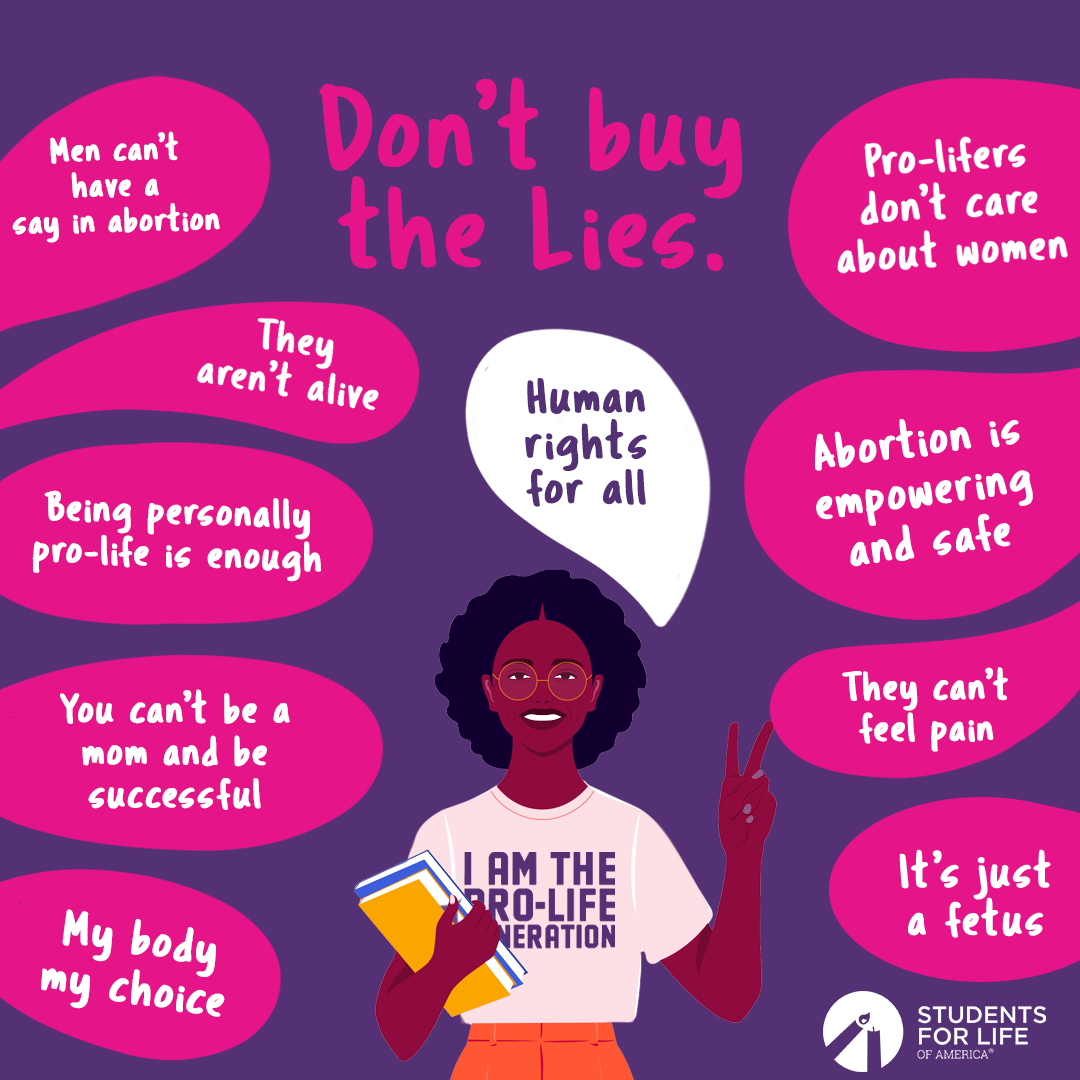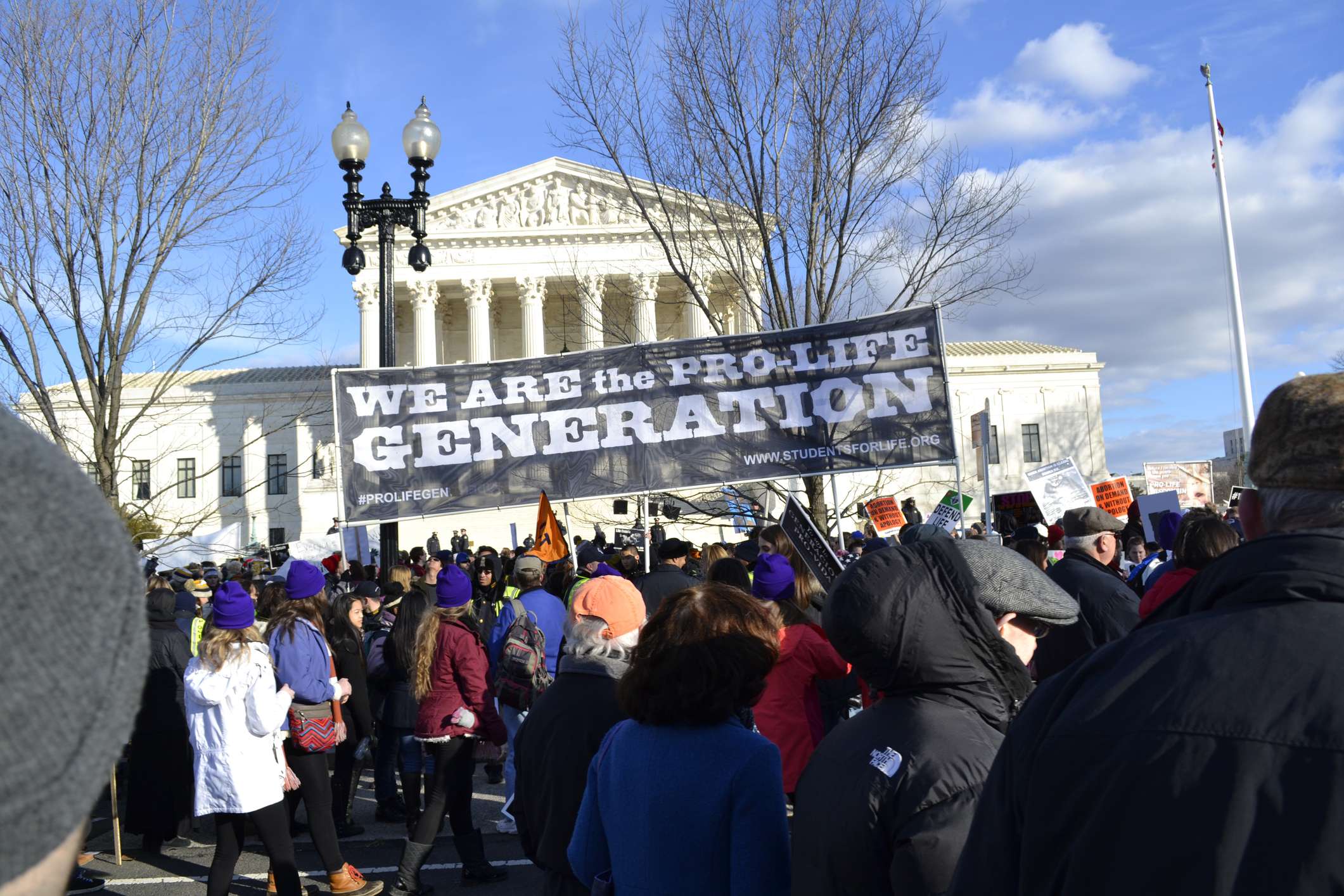
The following is a message from SFLA President Kristan Hawkins:
WOW. It was an exciting day.
I was not expecting to be on NPR, MSNBC, EWTN, ABC, and more, talking about the moment we’ve been dreaming of since we launched Students for Life – the impending reversal of Roe v. Wade.
Of course, we’ve always known Roe would be reversed.
But the Supreme Court leak of a draft of the majority decision (verified as authentic by the Court) took the entire nation by surprise late last night.
So, of course, the Students for Life team was out at the Supreme Court today to make our support for Roe‘s reversal known.
As you might imagine, this situation is rapidly changing, and we’re doing everything possible to keep the Pro-Life Gen updated.
Note: This was only a draft decision…no final decision has been released yet. It was leaked as a desperate measure by the pro-abortion movement to bully the Supreme Court Justices to change their minds before the final decision.
So, while we wait for the final decision (which we pray is the reversal of Roe)… I know you’re seeing A LOT of crazy stuff on social media.
As expected, abortion supporters are losing their minds.
While plenty of that is funny, there are a few genuine concerns they raise that we, as a movement, need to address.
What follows is a “toolkit” I made for you to communicate effectively on critical topics surrounding Roe’s impending reversal.
At the bottom of this email, you’ll find sharable graphics and videos to help guide your efforts!
Roe v. Wade and Privacy
There is concern among some that reversing Roe will impact “privacy rights” like those that were identified in Griswold v. Connecticut (which allowed married couples to acquire contraception) and Obergefell v. Hodges (which legalized gay marriage).
Those who are panicking about privacy, or, simply trying to stir panic among others, are muddying the water by suggesting Roe‘s reversal will have an effect on many other issues.
Here are some of our talking points…
- The language of the draft indicates that the Roe v. Wade decision is hyper-focused on abortion. They are very intentional about distinguishing abortion from an actual issue of privacy because abortion deals with “a critical moral question:” ending a human life.
- Neither abortion nor privacy appear in the Constitution, yet, in the context of a civilized society, we argue that privacy can’t include ending someone else’s life. Your rights cannot infringe, especially lethally, on someone else’s.
- Roe v. Wade itself deviated from its legal foundation in privacy with the 1993 Planned Parenthood v. Casey decision. On page 51 of the draft, it is written, “When Casey revisited Roe almost 20 years later, very little of Roe‘s reasoning was defended or preserved. The Court abandoned any reliance on a privacy right and instead grounded the abortion right entirely on the Fourteenth Amendment’s Due Process Clause.”
What About Rape?
Abortion in the case of sexual assault is another trending topic as tensions swirl regarding Roe‘s future. The consistent messaging of the pro-life movement stands firm…
- We don’t issue birth certificates in the United States with a ratings system based on how someone was conceived.
- We don’t advocate for prejudice against people based on perceptions of their abilities, sex, race, or parents.
- What has been missing in conversations on the so-called exceptions is how children conceived in rape value and see their lives. We see them as valuable, worthy of love, and welcome.
- Clearly crimes must be fully prosecuted, and women helped. But we mourn as well for the preborn who also suffer.
- We recommend promoting the stories of people conceived in rape, such as Ryan Bomberger.
- Read more about responding to challenges about abortion and rape here.
Bodily Autonomy
With the reversal of Roe, the Pro-Life Gen can expect to hear and see “My Body, My Choice” near constantly. That mantra is just as off-base now as it’s always been.
- It is 2022. The science of how mammals (i.e. humans) gestate offspring is pretty set in stone. There are two (or more) bodies in play during a pregnancy. Multiple sets of DNA, blood types, body parts, etc.
- Women should make all decisions concerning their bodies. But that cannot ethically involve killing a human being who resides within it.
- The draft decision which looks to reverse Roe says nothing of women’s autonomy. It says that Roe was wrong and states can set their own abortion laws.
- Read more about responding to bodily rights arguments here.
Back Alley Abortions
For those genuinely concerned that making abortion unavailable in many places will put women in danger, I advise using these talking points to help guide your response…
- This formula (“We have to keep it legal or else people will keep doing it anyway but more dangerously”) does not work in the context of other crimes. If we were talking about bank robbery instead, advocates for robbery would not be able to argue, “We have to keep armed bank robbery legal or else the robber could be hurt,” without being ridiculed. A crime that hurts other people cannot be legalized via the “if you can’t beat ’em, join ’em” mentality.
- Legalizing abortion didn’t even make it safer. It just moved the “ABORTION” sign from the back door to the front. Read more about how dangerous legal abortion has been here.
- Click here to see the list of women who have been killed by legal abortion.
- A recent study fully debunks the myth that legal abortion keeps women safer. Dr. Calum Miller, a British physician and ethicist, published findings this spring that actually proved the opposite.
- Legalizing abortion did not reduce the number of women dying from abortion. Some evidence suggests it led to more women dying.
- Legalizing abortion didn’t even reduce the number of women having illegal abortions – the number of illegal abortions actually increased, while the number of legal abortions skyrocketed.
- The severity of the complications women had increased dramatically when abortion was legalized. The proportion of women admitted to intensive care tripled. And in the following years, there was a further 50% increase in severe complications, and the proportion of women with organ failure quadrupled.
People Don’t Actually Like Roe v. Wade
Obviously, a major component of people’s ire about reversing Roe is the myth that Americans actually like it in the first place. Our polling has not found that to be true…
- More than ever, Millennials and Gen Z want a voice and a vote on abortion. An astonishing 8 in 10 want to vote on abortion policy in their states – UP from 66% last year.
- Standing firm in their desire for less abortion, once again 3 out of 4 Millennials and Gen Z want limits with more than 4 in 10 favoring either no abortion at all or abortion limited to the exceptions of rape, incest, or to save the life of the mother.
- While the economy is the political issue that most concerns a plurality of voters, 1 in 5 say abortion also motivates their vote (19%). (This compares with a recent Associated Press poll that found 13% of Democrats said that abortion was an issue they wanted the federal government to address, up from less than 1% in 2021 and 3% in 2020.)
- In fact, after learning more about Roe, almost 6 in 10 oppose Roe’s radical reach, of abortion through all 9 months of pregnancy.
I hope that overview helps in your conversations at this crucial time!
Plus, as promised, I’ll drop some good social media content below.
I just dropped a new Explicitly Pro-Life podcast episode that discusses a lot of these topics AND I was on MSNBC today talking about them, too!
Thanks for standing alongside me in this fight. This day is even more exciting than I ever dreamed.
But buckle up – the ride has only just begun!


















Share this post
Recent Posts

National Celebrate Life Weekend Dominates D.C.: Just Look at the Coverage
01 Jul 2025
The Pro-Life Generation REACTS: “Big, Beautiful” Budget Bill Vote One Step Closer to Defunding Planned Parenthood & ALL Abortion Vendors
01 Jul 2025
News: FIVE Lawmakers Recognized for Defending Life
30 Jun 2025
